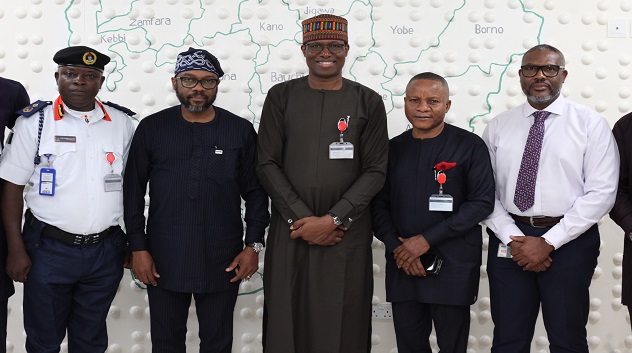Telecom
UBA, Ecobank, Others Turn to IBM Hybrid Cloud and AI Solutions to Accelerate Digital Innovation

IBM on Wednesday announced that major financial institutions across Africa have selected hybrid cloud and AI capabilities from IBM to unlock digital innovation and continue their work to develop digital-first solutions, ultimately broadening access to financial services on the continent.

COVID-19 continues to accelerate the already rapid changes that were happening across the financial services sector in Africa, fast-tracking the adoption of digital technologies to boost financial inclusion. With over 475 million Africans expected to be mobile internet users by 2025 GSMA –The mobile economy sub-Saharan Africa 2020, digital and mobile play a critical role in facilitating the delivery of digital financial services to consumers who transact on their mobile phones.
As banks focus their efforts on open innovation, security and high-value services, hybrid cloud solutions have become increasingly important to deliver seamless and secure digital banking experiences.
“Enterprises, especially those in highly regulated industries like financial services, face unique challenges when it comes to balancing innovation and regulatory compliance,” says Alan Peacock, General Manager, IBM Cloud.
“For decades, IBM has been fuelling the transformation of the financial services industry, bringing IBM’s trusted industry experience and leadership in security and data privacy to help banks modernize, transform operations and drive innovation.”
According to IBM’s COVID-19 future of business study, more than 59% of the organisations that participated said that the pandemic accelerated digital transformation, and more than 75% of responding executives indicated they expect changed customer behaviour to continue after COVID-19.
As companies in the financial services sector are speeding up transformation, IBM hybrid cloud and AI solutions are supporting their drive to accelerate digitalisation in different parts of the continent.
“In the past year we have seen banks navigate changes brought on by a growing preference for digital and mobile solutions, increasing smartphone penetration and the demand for convenience, innovation, and simplicity from today’s modern consumer, says Angela Kyerematen-Jimoh, Regional, General Manager for IBM North, East and West Africa.
“As banks across the continent take advantage of the opportunity to provide digital financial services which boost financial inclusion, IBM is working with Africa’s leading financial groups to deliver intelligent, cloud-based, digital-first innovation through IBM’s hybrid cloud and AI capabilities.”
Ecobank, the pan-African banking conglomerate, with banking operations in 33 African countries, has adopted a hybrid cloud approach to extend its reach to millions across Africa.
Using IBM Cloud, Ecobank migrated their flagship mobile banking application to leverage the on-demand capacity of resources that can support sudden spikes in traffic on its mobile banking services. Ecobank also has access to other IBM cloud services that can be used to develop more innovative, digital-first solutions to enhance their own client experience.
With over 12 million customers on its flagship mobile application, Ecobank is on an accelerated digital banking transformation journey and is set out to expand its digital offerings and grow the 30 million digital transactions it already processes on its platforms. As part of this journey, the Pan-African banking conglomerate has built scalable business solutions which allow for ease of integration with third-party providers using their open digital banking platform for a growing customer base.
Pan-African bank, Nedbank has set out to deliver superior digital experiences to customers. To achieve this, the bank is modernising its core banking applications with a hybrid cloud strategy and has partnered with IBM to help bring digital products and services to life.
To take advantage of the flexibility and agility offered by modern cloud technologies on this digitalisation journey, Nedbank explored a hybrid multi cloud approach, adopted the IBM Garage methodology to implement IBM Cloud Pak for Integration.
Through IBM Garage, the bank was able to deep dive and explore fresh solutions and in a week achieved what would have taken them months. Faced with the need to integrate complex legacy systems, Nedbank turned to IBM Cloud Pak for Integration to help build a simplified and standardised integration approach to their cloud strategy.
This enables Nedbank to shift their legacy applications into the cloud and integrate with other cloud-based applications they are consuming as they modernise and position for future innovation.
Attijariwafa bank, the Pan African Banking and Financial Group, has adopted IBM hybrid cloud solutions software to advance the digitisation of its banking operations, and quickly bring new digital services to its customers, all in a secure and flexible environment.
Using IBM Cloud Paks that are built on Red Hat OpenShift, the leading bank will streamline and better integrate front-and back-office processes and to modernise business and IT operations.
By deploying IBM Cloud Paks, Attijariwafa bank will modernise and manage its core banking applications like its corporate banking application, on a secure, integrated and easily scalable environment.
This will allow a rich and simple customer interaction while decreasing the time to bring new offerings to market. It will also enable the banks’ employees to focus their effort and time on serving their customers better.
This collaboration with IBM supports the digital transformation strategy of the bank and facilitates a full modernisation of the bank’s operations in an open, hybrid cloud environment.
United Bank for Africa Plc (UBA), Africa’s global bank operating in 23 countries globally and with headquarters in Nigeria, has set a goal to grow its transaction volume significantly over the next few years and to deepen retail market penetration.
To achieve this, they would be required to attract the unbanked, acquire new customers through digital banking and retain existing customers by adopting a “No Transaction Must Fail (NTMF)” initiative.
Using IBM POWER9-based servers, Flash system storage and IBM PowerVC (Power system virtualization & cloud management), UBA set up a scalable, private cloud environment that is cost-effective taking the first step towards embracing a hybrid cloud model.
Customers’ needs are evolving as they seek banking services across channels and expect personalization. Co-operative Bank of Kenya turned to IBM to modernize their core banking platform and reach their customers on different channels including mobile and online while offering customized services driven by insights.
For this, they required a technology that would also empower their employees who work across teams to simplify processes, optimize customer data, while also achieving goals like reducing infrastructure and maintenance costs. With IBM Power and FlashStorage solutions, they now derive improved insights on customer data, faster query resolutions, quicker time-to-market on new services across channels – all backed by high available, scalable, cloud-and AI-ready technology.
Banco Mais, a leading bank in Mozambique, turned to IBM to help streamline its business processes and reduce turnaround times for customer-facing services. In the face of a growing competitive market locally, Banco Mais needed to develop financial service products faster to retain and gain market share.
Banco Mais implemented IBM Business Process Manager on Cloud service and was able to start projects quickly and deploy process application solutions without the need to build the IT infrastructure. By turning to this IBM Cloud solution, they could develop, test, run and monitor their business processes at a fraction of the time it would otherwise have taken. As a result, Banco Mais reduced turnaround time for loans by 60% and decreased the time it took to implement services that took 3 to 4 months by 85% to improve customer experiences.
Earlier this year, IBM announced the general availability of the industry’s first financial services-ready cloud platform, IBM Cloud for Financial Services, as well IBM Cloud Satellite. First revealed in 2019, the IBM Cloud for Financial Services is designed to help reduce risk for financial institutions, their partners and FinTechs, and innovate quickly with built-in controls that are adhered to by the entire ecosystem. IBM Cloud Satellite brings a secured, unifying layer of cloud services for clients across environments, regardless of where their data resides, delivering security, data privacy, interoperability and open standards found in hybrid cloud environments.
Telecom
IHS Nigeria Hosts Telecom Industry Stakeholders to Discuss Protection of Critical National Infrastructure in Lagos State

IHS Nigeria, part of the IHS Holding Limited (NYSE: IHS) (“IHS Towers”) group, one of the largest independent owners, operators, and developers of shared communications infrastructure in the world by tower count, recently hosted a high-level meeting of stakeholders in the telecommunications industry including regulators and law enforcement agencies, at its corporate headquarters in Lagos.

The meeting was organized to develop a multi-stakeholder action plan for the protection of Critical National Information Infrastructure (CNII) assets in Lagos state.
Recognizing the importance of communications infrastructure as the backbone of national security, economic growth and social cohesion, the stakeholders at the meeting convened under the umbrella of the Association of Licensed Telecoms Operators of Nigeria (ALTON) agreed on the urgent need for collaborative solutions to ensure the protection of these vital assets.
The meeting was attended by senior representatives from the telecommunications stakeholder groups and regulatory bodies including the Nigerian Communications Commission (NCC), the Association of Licensed Telecoms Operators of Nigeria (ALTON), Association of Telecommunications Companies of Nigeria (ATCON) and the Lagos State Infrastructure Maintenance and Regulatory Agency (LASIMRA).
Also in attendance were representatives from the Mobile Network Operators (MNOs), and InfraCos as well as the Nigeria Security and Civil Defence Corps (NSCDC), the security agency tasked with the protection of Critical National Infrastructure across the country.
Following extensive deliberations, the stakeholders resolved to establish a working group dedicated to addressing key industry challenges, including the vandalization and theft of telecommunications infrastructure, arbitrary shutdown of base stations, fiber cuts due to road construction and the denial of access by unauthorized individuals by leveraging technology for real-time monitoring and protection, strengthening security measures around telecommunication sites and collaborating more with the security and regulatory agencies to mitigate these challenges.
The stakeholders underscored the need to prioritize deterrence and prevention of these incidents and highlighted the importance of public awareness campaigns to sensitize the host communities and public of the need to protect telecommunications infrastructure in their localities.
Dapo Otunla, Senior Vice President & Chief Corporate Services Officer of IHS Nigeria, commented, “The protection of Critical National Information Infrastructure (CNII) has been a critical concern for all industry stakeholders.
“We are experiencing daily losses of assets, which significantly impact on the quality of service delivered to subscribers. Addressing these issues is paramount to sustaining Nigeria’s digital ecosystem and meeting regulatory expectations.”
Telecom
MTN Champs Continental Relays: Over 1,000 Athletes Gear Up for Lagos Showcase

Over 1ooo athletes are already set to participate in the upcoming MTN Champs Continental Relays, taking place between April 9 and April 12 at the UNILAG and Yabatech Sports complexes. Organisers anticipate even more registrations before the April 2 deadline.

MTN Champs is Nigeria’s largest grassroots sports competition, a collaboration between MTN Nigeria and Making of Champs (MoC), providing a platform for young athletes to showcase their talents and potentially represent Nigeria on the global stage.
Osaze Ebueku, Senior Manager, Go-to-Market at MTN Nigeria at the opening ceremony of the MTN Champs Classics events in Benin had emphasised the long-term vision behind MTN Champs: “We’re building future Olympians for Nigeria. MTN Champs is about more than competition. It’s about changing lives.”
The continental relays mark the second leg of the MTN Champs Season 3, following the Classics competition in Benin, which saw 4,371 event entries from 2,056 athletes.
As of March 24, the Lagos leg had already recorded 2,821 event entries across different age categories, highlighting the growing enthusiasm around the competition.
The registered athletes are spread across four categories, with 174 in the Cadet (U-14) category, 388 in Youth (U-17), 270 in Junior (U-20), and 279 in the Senior category.
To ensure smooth participation, organisers have outlined important guidelines. Athletes in the Cadet, Youth, and Junior categories must submit a signed Parental Consent Form, while all registered schools and athletes must collect their competition bibs by April 8 at the competition venue to confirm their participation and secure their place on the start list.
Sports enthusiasts can look forward to an electrifying showcase of emerging talent, as young athletes seize the opportunity to prove their skills on a professional stage.
Telecom
Again, Labour Fumes, Threatens Shutdown of Telcos over Non-Implementation of 15 Percent Tariff Reduction

Nigeria Labour Congress (NLC) is threatening to shut down operations of telecommunications companies over their refusal to comment on the 15 percent reduction in telecom tariffs.

Recall that that organised labour, through the NLC, forced the federal government and NCC to reduce the telecommunications tariff hike from 50% to 35% after threatening to shut down telecom operations and the NCC in response to what it saw as exploitative economic policies amidst excruciating suffering, hardship, and deepening poverty.
The government had previously formed a 10-member committee, consisting of five government and NLC representatives, to deliberate on the thorny topic of tariff hikes within two weeks and report back before making a final decision on the new telecom tariff structure.
Consequently, on Friday, February 21, 2025, the committee, at a meeting conducted in the office of the National Security Adviser (NSA) that lasted nearly three hours, decided on a 15 per cent tariff cut.
According to reports, in accordance with the conditions of the agreement, an official communiqué announcing the tariff reduction was scheduled to be released on Saturday, February 22.
According to Chronicle,iIt was said that the meeting began at 4:00 p.m. and concluded around 7:00 p.m., during which NLC representatives insisted that the tariff hike be withdrawn.
According to sources, after significant pressure from NLC representatives in the 10-man committee, the government and NCC gave up and agreed on the 15% decrease, which the government or NCC should have announced the next day.
However, at the time of this report, no such announcement has been made.
Leaders of the labour union are not taking the government’s failure to announce or implement the 15% tariff decrease lightly, suspecting that they have been duped.
The Labour leaders have therefore resolved to directly confront the NCC and telecommunications operators next week.
Though it has been reported that the date for the start of the industrial action against the NCC and telecom providers has been set and mobilisation is underway, the information is being closely guarded.
One of the leaders of the NLC stated that “We have received directives to commence mobilisation since last week. In fact, the date for the commencement of industrial action against the NCC and telecommunication operators’ offices across the country has been fixed. We have been warned not to disclose the date because the plan is to take all concerned by surprise. We are not giving any notice because we thought we had resolved this matter over a month ago. It is as if we have been scammed. Therefore, we have decided to confront the matter head-on.”
On February 12, the NLC expressed outrage over telecommunications companies’ tariff hikes, despite an earlier agreement with the Federal Government and the NCC.
According to the Labour union, “If the telecommunications companies fail to revert to the old tariff by the end of February 2025, a total shutdown of their operations nationwide will commence on March 1, 2025.”
To demonstrate its seriousness, the NLC declared that, as a first step in resisting the arbitrary tariff hike, it directed that workers and other willing citizens boycott the services of MTN, AIRTEL, and GLO daily between 11:00 a.m. and 2:00 p.m. until the end.
On Tuesday, February 11, NLC leaders issued a communiqué at the conclusion of their Central Working Committee (CWC) meeting in Lokoja, Kogi State, urging workers and citizens to suspend data purchases from telecommunications companies, which have also become one of their most effective tools for exploiting Nigerian citizens.
The communiqué, signed by Joe Ajaero and Emma Ugboaja, Congress’ President and General Secretary, respectively, instructed NLC State Councils and industrial union affiliates to quickly sensitise and mobilise their members and the general public in their jurisdictions.

 Telecom2 days ago
Telecom2 days agoAgain, Labour Fumes, Threatens Shutdown of Telcos over Non-Implementation of 15 Percent Tariff Reduction

 News2 days ago
News2 days agoNNPC Ready to Go to Capital Market for IPO- CFIO

 E-Business2 days ago
E-Business2 days agoFG Launches Online Visa Approval Centre

 E-Business2 days ago
E-Business2 days agoQNET Disassociates From Fraudulent Academy in Abuja, Supports EFCC Arrest

 E-Business2 days ago
E-Business2 days agoFirm Discovers Sophisticated Chrome Zero-day Exploit Used in Active Attacks

 E-Business2 days ago
E-Business2 days agoNITDA Partners JICA to Launch Nigeria-Japan Startup Hub

 Telecom1 day ago
Telecom1 day agoIHS Nigeria Hosts Telecom Industry Stakeholders to Discuss Protection of Critical National Infrastructure in Lagos State

 E-Financial2 days ago
E-Financial2 days agoFintech, Remittances Anchor Africa’s Booming Payments System


























